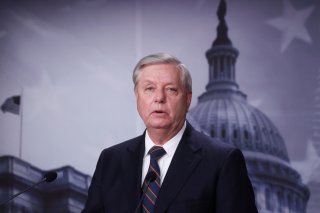Justice Thomas Freezes Graham’s Subpoena for Election Probe
Supreme Court Justice Clarence Thomas on Monday temporarily blocked a subpoena requiring Sen. Lindsey Graham (R-SC) to testify before a special grand jury that is investigating efforts to overturn the 2020 presidential election.
Supreme Court Justice Clarence Thomas on Monday temporarily blocked a subpoena requiring Sen. Lindsey Graham (R-SC) to testify before an Atlanta-area special grand jury that is investigating efforts to overturn the 2020 presidential election in the state, Politico reported.
The Republican lawmaker filed the emergency request on Friday, one day after a federal appeals court ruled that he must testify. Thomas, who handles emergency requests from Georgia, issued the administrative stay unilaterally. The court has asked for a response from Georgia’s investigators by Thursday.
Fulton County District Attorney Fani Willis opened the high-profile investigation early last year after a January 2, 2021, phone call between Trump and Georgia Secretary of State Brad Raffensperger. During that conversation, Trump told Raffensperger that he could “find” the votes needed to overturn his narrow loss in the state.
Willis and her team have stated that they want to ask Graham about two specific phone calls they say he made to Raffensperger and his staff shortly after the election. During those calls, Graham asked about “reexamining certain absentee ballots cast in Georgia in order to explore the possibility of a more favorable outcome for former President Donald Trump,” according to Willis. Moreover, the senator “made reference to allegations of widespread voter fraud in the November 2020 election in Georgia, consistent with public statements made by known affiliates of the Trump Campaign.”
Meanwhile, Graham, who has been fighting the subpoena since it was issued in July, has repeatedly contended that he shouldn’t have to answer questions about the calls because they had a legislative purpose and therefore were covered by the speech and debate clause of the Constitution.
As reported by CNN, Graham told the justices in court filings that his calls with Georgia officials were related to the “impending vote on certifying the election,” and because, as chairman of the Senate Judiciary Committee at the time, he was tasked with “reviewing election-related issues.”
“The district court’s and District Attorney’s apparent suspicions about motives are baseless, but even assuming otherwise, the Speech or Debate Clause was designed to prevent exactly this sort of examination,” Graham wrote, adding that a lower court was “wrong, also, to think that any other lines of hypothetical questioning would be permissible.”
The 11th U.S. Circuit Court of Appeals had asserted that “communications and coordination with the Trump campaign regarding its post-election efforts in Georgia, public statements regarding the 2020 election, and efforts to ‘cajole’ or ‘exhort’ Georgia election officials are not legislative activities protected by the Speech and Debate Clause.”
Ethen Kim Lieser is a Washington state-based Finance and Tech Editor who has held posts at Google, The Korea Herald, Lincoln Journal Star, AsianWeek, and Arirang TV. Follow or contact him on LinkedIn.
Image: Reuters.

